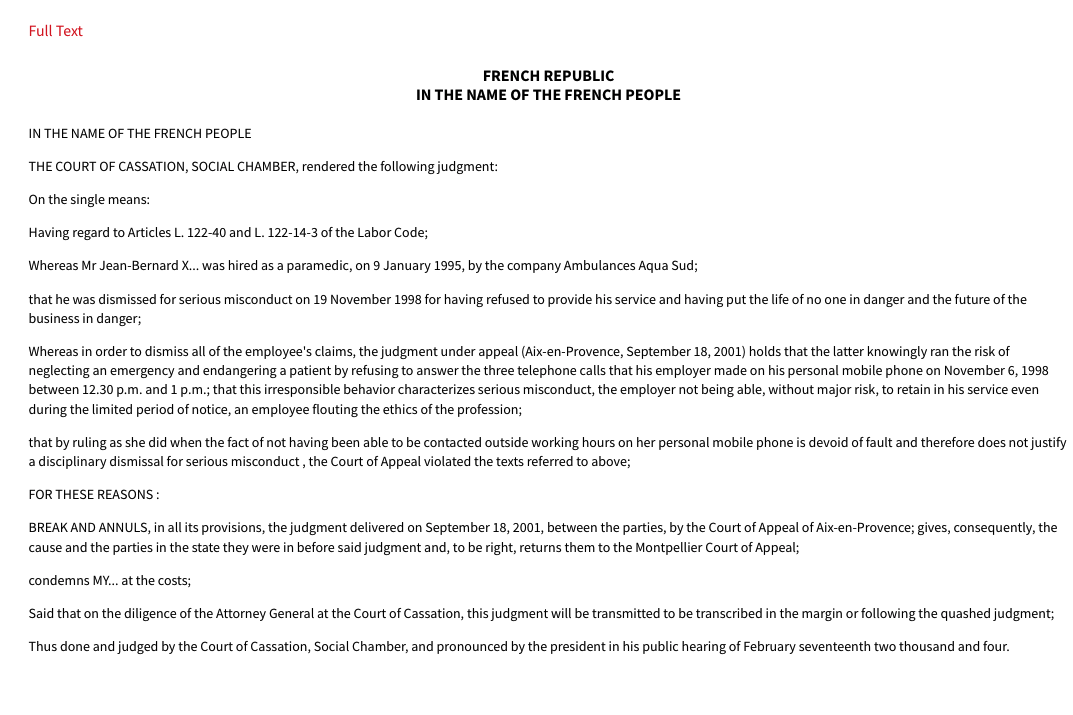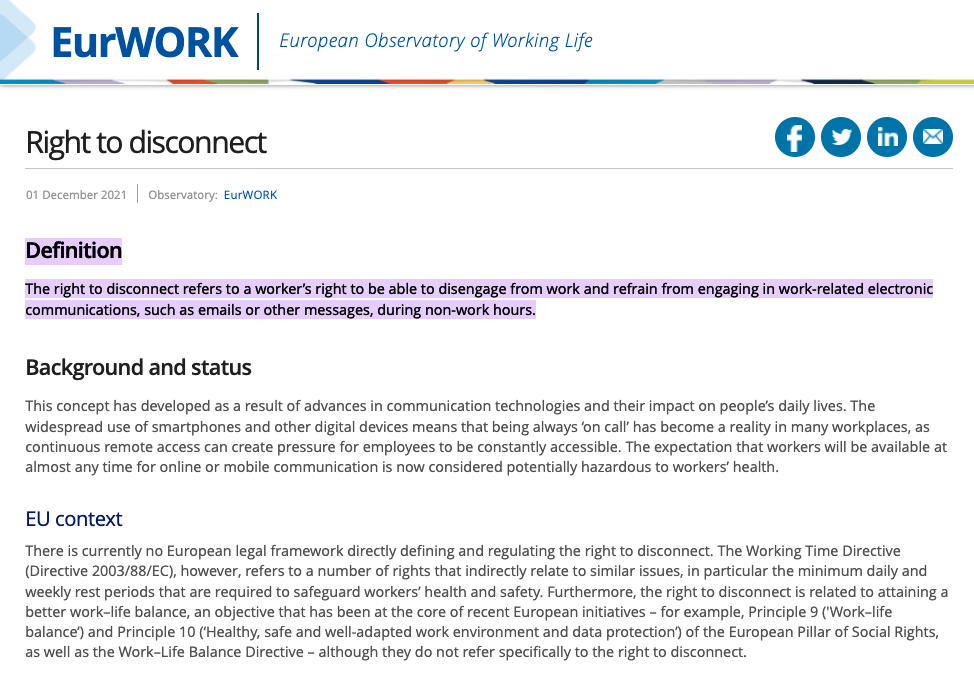How the “right to disconnect" might become a human right in the EU

A few minutes every morning is all you need.
Stay up to date on the world's Headlines and Human Stories. It's fun, it's factual, it's fluff-free.
“Not only will the right to unplug be beneficial to the mental health of the workers, it will be beneficial to companies in terms of productivity and the bottom line. Many studies show that breaks and disconnecting from work actually increase productivity, creativity and accuracy,” explained Alexis Haselberger, a time management and productivity coach.
What is the “right to disconnect?”
- The right to disconnect (also called the right to unplug) is the idea that once you go home from work, you don’t have to respond to your employer. So, in other words, you can really disconnect.
- The idea has actually been around for some time in the European Union. For example, in France, it first came up in the early 2000s after a French court said that an ambulance driver who didn’t pick up their phone after hours was wrongfully fired.

- Now it’s 2022, and the connection between work and the need to disconnect has grown even stronger – both through the technology that now makes employees available 24/7 and the pandemic, which led to millions of people working from home and the line between work and life blurring further.
- “The grand majority of professionals face unrealistic expectations on their time,” said Alexis Haselberger, a time management and productivity coach.
- “Sometimes the expectations are real and sometimes only perceived, but either way, the effect is clear. People feel as though they have to be ‘always on,’ always available and that they are never doing enough.”
- So now, many are looking to the EU to act on this.
Is disconnecting from work that important?
- According to Haselberger, the answer is a resounding yes on all fronts.
- “Not only will the right to unplug be beneficial to the mental health of the workers, it will be beneficial to companies in terms of productivity and the bottom line. Many studies show that breaks and disconnecting from work actually increase productivity, creativity and accuracy.”
- “Additionally, happier workers are more productive, and people are happier when they have a sense of agency and control over their time, versus feeling as though their employer controls their time.”
- And some companies have caught on to these benefits. For example, Volkswagen Group has implemented blocks on work email accounts past a certain time for some workers.
- Experts say that this is the right spirit, even if this particular implementation might have some flaws (for example, urgent situations may lead some people to contact personal emails instead of work emails if the sender knows the recipient won’t be on their work email).
What are other people saying?
- For Agius Saliba, a lawmaker at the European Parliament leading efforts on this issue, the line between a person’s personal and professional life has only become more blurred and problematic throughout lockdown.
- “The political push is there because the visibility of overwork and this blurring between working time and private time has continued to be blurred during the pandemic because of the increase in the number of teleworkers, smart working, flexi-working, so something needs to be done,” Saliba told CNBC.
- But others say that a law like this isn’t practical because many of us, especially while we’ve been working at home, don’t have set working hours.
- Others say that in the situation that a law like this does come into force, employers are going to ensure that you’re available and fully occupied during your “on" hours. This may mean immediate responses to phone calls and emails when you’re “on," which may not be a good thing.
So what are the laws in the EU?
- There still isn’t any EU-wide law on the subject, but some countries, including France, Ireland and Italy, have domestic laws on it.
- For example, in 2017, France introduced law that looked to create times that a remote worker’s obligations begin and end. The following year, a pest control firm, Rentokil, was ordered to pay 60,000 euros (US$71,000) for breaking those rules.
- Ireland now has a COVID-19-conscious code. Starting from early April 2021, Irish workers have the right to not routinely perform work outside normal working hours and not be penalized for refusing to attend to work matters out of hours. Ireland’s Deputy Prime Minister Leo Varadkar explained to RTÉ News that this was created because more people were being made to “work for free from their home.”
- In January of 2021, though, the European Parliament voted and passed a resolution in favor of the right to disconnect, which means that the legislation then goes on to the European Commission, which is the executive function of the EU. But the European Commission has been slow to act, making some wonder if the group considers this a low priority subject.

- Organizations representing employers have argued that the legislation is too broad and that some previous guidelines are better at solving this issue than new “one size fits all” legislation.
- Some unions, on the other hand, have said that this legislation doesn’t go far enough to protect the right to unplug for workers.
What’s next?
- While it’s hard to say, what’s clear is that a movement has started in the EU.
- This is also amid a “great resignation,” which has created a worker shortage worldwide, leading to companies increasing pay and benefits in an attempt to attract and retain workers.
- According to Haselberger, “I suspect that more European companies will adopt such rules going forward, but I think that it would be very difficult for countries like the (United States), where the focus on capitalism and endless progress and innovation is more prevalent and the idea of work/life balance is not something that is valued as a whole.”
- But it isn’t entirely unheard of in the US either – in 2018, the New York City Council filed a piece of legislation that would ban most companies from requiring their workers to reply to after-hours emails and text messages.
- So going forward, there are two main places to be watching for any potential legal progress in the subject: The EU and major cities in the US.
You drive the stories at TMS. DM us which headline you want us to explain, or email us.







Comments ()